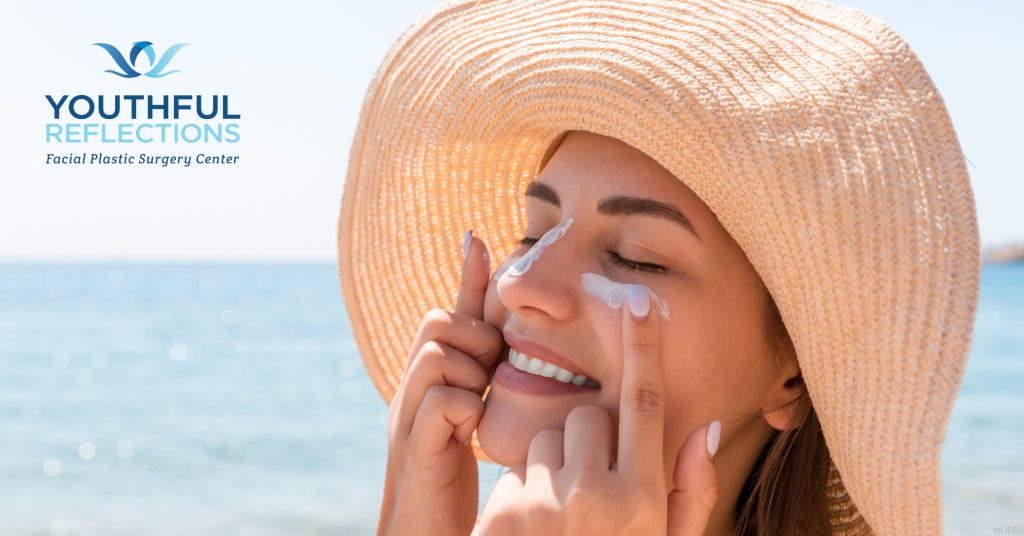You can use hundreds of different beauty products, but one step is essential—applying sunscreen. Here at Youthful Reflections, we believe sunscreen is one of the most important skincare products you should own. It’s critical to remember to apply sunscreen after you’ve had any type of facial procedure at our practice. That’s why we’re sharing helpful tips below about how to choose the right sunscreen for your skin type.
Keep scrolling, and take our quick quiz to see which sunscreen may suit your needs.
Understanding the Importance of Sunscreen
According to the American Academy of Dermatology, 1 out of 5 Americans may develop skin cancer. In 2025, it is estimated that about 8,430 people will die from melanoma, a deadly type of skin cancer. While people may associate sunscreen with the hot summer months, the sun’s rays are also damaging during the fall and winter. That’s why it’s essential to apply sunscreen year-round.
Ultraviolet light (UV) is the primary cause of skin cancer. While exposure to UV light is unavoidable, you can limit it. Protective clothing, sunglasses, visors, and hats are all effective tools for reducing UV light exposure.
Exploring Different Types of Sunscreen
Many different types of sunblock products are on the market, but certain products may work better than others depending on your unique needs. For instance, if you are prone to breakouts, you may want to avoid sunscreens that contain heavy or pore-clogging ingredients, as they can sometimes exacerbate oiliness or trigger acne in sensitive skin types. And those with oily skin may not be happy with a product designed for those with dry skin. With so many different options, knowing which is the best one for you can be difficult.
First, let’s look at the difference between the two main types of sunscreen:
Chemical Sunscreen
This sunscreen absorbs the UV rays before they can penetrate deeply into the skin, converts them into heat and then releases that heat from the body. The active ingredients in chemical products are:
- Avobenzone
- Octinoxate
- Oxybenzone
Chemical sunscreens may be best if you regularly work out, swim, play sports, or sweat a lot during the day, as many of these formulas are water- or sweat-resistant.
Physical (Mineral) Sunscreen
Physical, or mineral sunscreen, sits on the skin’s surface and reflects the sun’s rays. The active ingredients in physical products are:
- Titanium dioxide
- Zinc oxide
Physical sunscreens tend to be gentler on sensitive skin.
What You Should Look For in All Sunscreens
Regardless of whether you choose a chemical or physical sunscreen, you should look for the following attributes:
• Broad Spectrum
• Noncomedogenic
• Oil-free
• Paraben-free
• SPF of 30 or higher
I highly recommend ZO® Sunscreen Primer to my patients for its broad-spectrum, multi-defense protection and hydrating properties. It’s one of many skin-friendly products available in ZO Skin Health’s catalogue of medical-grade products.
Tips for Choosing the Best Sunscreen
Check out the following helpful tips for choosing the best sunscreen for sensitive skin, oily skin, and other specific skin types.
Children’s Skin
Since chemical ingredients, particularly para-aminobenzoic acid (PABA) and oxybenzone, can cause skin reactions, people with sensitive skin, including children, should use physical sunscreens instead of chemical ones.
Sensitive Skin
If you are predisposed to allergic reactions, rosacea, or acne, you should avoid using products with fragrances or alcohol. Preservatives, PABA, and oxybenzone are also not recommended for people with sensitive skin.
The best sunscreen for sensitive skin should not have ingredients that trigger skin reactions. Some good ingredients that are easy on your skin include ecamsule and salicylates.
Dry Skin
Your skin can dry out quickly when you are out in the sun. The best way to combat this problem is by using sunscreen that also moisturizes your skin.
Dry skin is often considered part of the aging process. However, people of all ages can have dry skin, including those with eczema. Choose products with soothing emollients and adequate sun protection.
If your favorite sunscreen does not provide enough hydration, here is a trick you can try: Get a thick moisturizing cream, preferably one without fragrance, mix it with your sunscreen, and apply it to your face and body.
Oily Skin
Individuals with oily skin need to be more careful with their sunscreen selections. Gel formulas and alcohol-based products may be helpful. Typically, it is best to go with lighter lotions.
Mineral sunscreens work well in providing a matte look for those with oily skin because they can be drying. In this case, you may want to opt for chemical sunscreens for results you will love.
Combo Skin
Combination skin often indicates that certain parts of your face are dry while others are oily. This unevenness makes choosing the right products a challenge. In this case, you may want to opt for a lighter sunscreen, as applying a lighter lotion will allow you to test out what will work while avoiding a product that’s too heavy on the oily zones of the face.
Get Sunscreen-Friendly: Take Our Quick Quiz!
Take a few minutes to answer the easy questions below, and begin exploring how to choose sunscreen that’s a great match for your skin and lifestyle:
While our quiz is a great start, we encourage you to explore your sunscreen and skincare options further by requesting a personalized consultation with us today or calling us at (615) 942-8016 to schedule an appointment. Youthful Reflections is here to help you keep your skin in its best condition. Our staff works with you every step of the way, from consultation through surgical and nonsurgical procedures.
This blog post was originally published in October 2019 and updated in May 2025.

